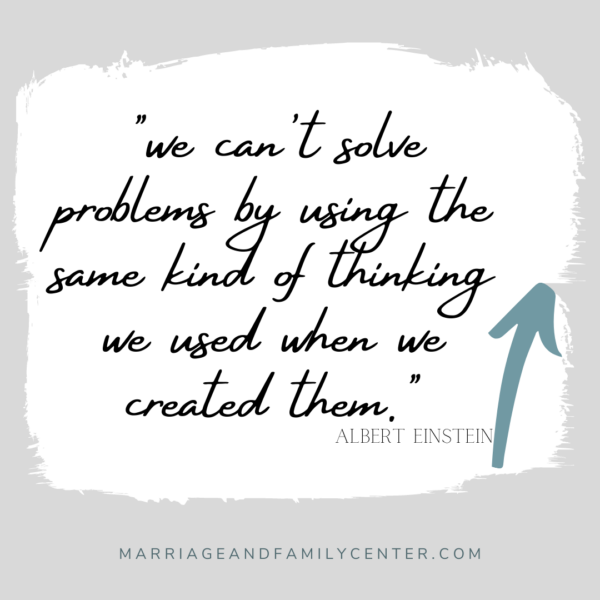Cognitive distortions are also known as “thinking errors”, and we all experience them. Like most cognitive functions, these “errors” usually begin as adaptive processes, examples of the way that our personal lens shapes the way we interpret our lives and relationships. But when they become distorted, they can start to take a toll on the way we view ourselves and the world around us.
Here, we’ll cover 5 Common Cognitive Distortions: Catastrophizing, Personalization, Overgeneralization, Black and white thinking, Mind reading.
Catastrophizing
The anxious mind uses catastrophizing in an effort to prepare us for the worst case. This is an important survival tool, but it’s not always a helpful way to see the world. Have you ever experienced catastrophizing thoughts?
Catastrophizing looks like: “If I fail this exam I’ll probably have to drop out of school. My life will be ruined”. Resist catastrophizing by using flexible thinking: One bad exam grade will not determine the whole course of my life.
Personalization
When you personalize situations, you misattribute the actions of others as being related to your own shortcomings. Have you ever caught yourself personalizing a situation? What would it be like to explore alternatives that release you from responsibility?
Personalization looks like: “My coworker wasn’t as talkative this morning. She must be mad at me” Resist personalization by looking for other alternatives: Maybe she had a rough morning, fought with her husband, doesn’t feel well, etc.

Overgeneralizing
Overgeneralizing is something we all do- it’s part of the way we organize our life experiences. This is part of the brain’s way of assessing physical and emotional risk based on our past experiences, which is an essential cognitive function. But taken to the extreme, it can reinforce negative self-perceptions and strain relationships.
When overgeneralized thinking becomes distorted, it looks like: “My wife didn’t notice that I vacuumed. No one ever appreciates me”. Counter overgeneralization by finding evidence to the contrary: I have been recognized for my contributions before, and I will be again.
Black and White Thinking
Black and white thinking happens when you view your world in all or nothing terms- people are good or bad, you’re loved or hated, etc. The best antidote to black and white thinking is cognitive flexibility- exploring your inner world in terms or both/and instead of either/or.
Black and white thinking looks like: “I ate a bunch of sweets while I’m supposed to be dieting. I’m such a failure, I may as well stop trying” Challenge black and white thinking by offering alternatives: “I may have strayed today, and I’m still committed to eating healthier. I can try to make a better choice next time.”
Mind Reading
Mind reading is exactly what it sounds like- it happens when we assume we know what others are thinking. It can have a huge impact on our romantic relationships by stunting communication before it can even begin. Assuming that we know how our partner will react or respond to us keeps us from contacting their authentic self. Mind reading shows up in other areas of life as well.
For example, at work, mind reading could look like: “I’m sure my boss thinks I’m a loser, why should I even bother asking for a promotion”. Counter mind-reading by asking for honest feedback, and giving people the opportunity to pleasantly surprise you.
Addressing Cognitive Distortions
Many counselors, particularly those who use Cognitive Behavioral therapy (CBT), will help their clients gain awareness of their cognitive distortions. By shifting toward a more balanced way of thinking, you can improve your self-perception and the way you relate to others.
Ready to start your therapy journey? Schedule your individual, couple, family or child session now!
Join one of our monthly newsletters to keep up with upcoming events, important information about MFCC, mental health and wellness tips. Choose from our general newsletter or topics specific to couples and relationships, family and parenting, or spiritual abuse and religious trauma.
We promise not to spam or pass out your information to anyone. And of course, you are always welcome to unsubscribe at any time.







